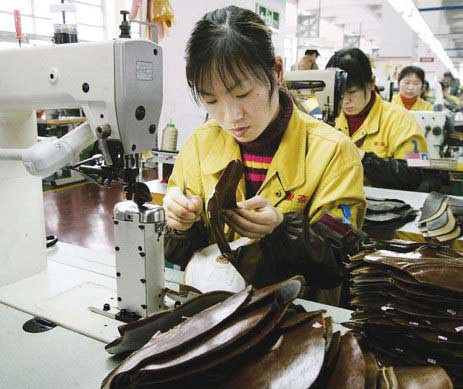
|
 |
|
Workers sew leathers in a shoe factory in Wenzhou. Provided to China Daily |
In the past decade, Wenzhou, China's hotbed of private capital had attracted businessmen from different regions, who ordered cheap products manufactured by the factories because the labor and materials cost were comparatively low.
"I've been working in Wenzhou since 2000, when there was few companies from other regions setting up offices here," said Henry Yeh, the manager of Wenzhou branch, Novi Footwear Ltd, a Taiwan based company mainly selling women shoes.
Yeh added, that Wenzhou as a small city in which thousands of manufacturers have gathered, experienced a peak period before 2008, and then went down gradually, affected by the worsening global export industry at a time when the city could no longer maintain an advantage in low-priced merchandise.
As Yeh noted, certain successful family businesses that passed on to the second generation failed to maintain product quality, as they had done in the past.
"Wenzhou, in the near future probably will turn into a financial city instead of the manufacturing hub, as more businessmen transfer their focus, to make investments in all industries," said Yeh.
Yeh added, that most Wenzhou businessmen are quite confident about their companies, when in reality, their prospects are not very good.
He thinks of Wenzhou as his second hometown and for that reason, is quite worried about the slowdown he has observed there in the past five years.
"I haven't seen many changes among my business partners, or willingness to upgrade their products for higher prices with better quality but they are still struggling in the tough low price market, among other manufacturers," said Yeh.
Since last year, local factories and other companies in Wenzhou have been suffering from a series of severe financial problems.
During the credit crisis last year, about 100 Wenzhou businessmen were reported to have disappeared, declared bankruptcy, and some even committed suicide over debts in excess of 10 billion yuan.
The flight occurred after State-owned banks, suddenly tightened their lending policies for SMEs after September, 2011.
Wenzhou was selected for a pilot project at the end of March, covering 12 major areas. The city was urged to develop privately owned financial services, establish village banks and rural financial agencies, and to encourage State-owned banks to lend to smaller businesses. .
"Most of the companies in the city have suffered tough times in the past years, with few orders from overseas clients and nearly zero profit," said Yeh.
Yeh added that if those companies still don't make alternations to their products, fewer new companies will come to the city proposing cooperative ventures.
 Domestic auto lineup looks overseas
Domestic auto lineup looks overseas Electric car industry in the slow lane
Electric car industry in the slow lane Brighter days for solar power
Brighter days for solar power Market flat, Japan-brand sales plummet
Market flat, Japan-brand sales plummet